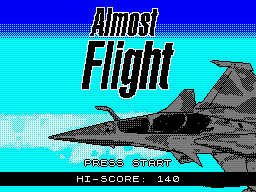Almost Flight
Flight simulator, © KesieV 2018

I've reserved this short rambling about simulators, a genre I fondly hate, just for the last entry of the Wright! bad simulator series "Almost", which I loved to code during these years.
As usual, let's have a quick look at the Wikipedia definition. It's pretty long this time but it's filled with interesting things: "A simulation is an imitation of the operation of a real-world process or system. The act of simulating something first requires that a model be developed; this model represents the key characteristics, behaviors and functions of the selected physical or abstract system or process. The model represents the system itself, whereas the simulation represents the operation of the system over time."
In simple terms, a simulation is a thing that imitates a real-world another thing so convincingly that may work as a replacement.
Wikipedia, as the term is commonly depicted, relates the whole simulators affair to a bunch of boring cold things, like safety engineering, testing, training and education. Except for the last entry, that is our illustrious intruder: video games.
I'd like to put extra emphasis on the word games. Ready for the usual questions the press love so much? Here we go.
Do the gamers prefer to experience a simulated replacement of reality instead of living their true one? Are these simulated experiences as fun as the real thing?
"No! Games are not a reality replacement! Gamers are normal people having fun! Life is way more exciting!" - Yeah. Okay. No. That's not entirely true.
As the saying goes: "life is short". And modern life, for most of us, it is also pretty boring.
You don't need to be gloomy to accept that. We daily live all the little surprises and subtle changes the life reserves. There may happen some major changes here and there, like the love of your life, a son, a journey... or something way less fun. More rarely your life may change from the ground up. And you are doing your best every day, taking everything you can from life.
But, both in the short and long term, you're still bound to a relatively limited number of roles and in a very tight range of fields, due to the social structure, your own capabilities and the obvious shortage of time.
But what if it was possible to create a large number of very approximative models of reality that anyone can experience in order to interact with just a very little slice of another life?
I know that's quantity over quality and that's not always a good option... but what if this option allow to do that instantly and whenever you want, so you don't have to plan it or get prepared?
And what if you could make a simulation of an experience that doesn't exist at all? Even a totally abstract one?
Making accessible simulations that can transfer an experience to someone else is one of the art finest purposes. Games are art indeed and they are interactive simulations that can side to your first-hand blood and flesh existence a vision of unlimited worlds before your time is up.
Plot!
Flight simulators are notoriously hard to play, so this time I've included the whole plot and instructions into the game. Run it and... good luck!
(Huge thanks to Diego Aroldi, a colleague of mine, for his friendship and for suggesting me this important missing genre for the Wright! collection)
(Want to share something? You can find me on Twitter!)
 Install / Add to home
Install / Add to home
 View game sources
...or play it online below!
View game sources
...or play it online below!